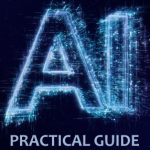Exploring the Multifaceted Applications of Artificial Intelligence Across Industries
Artificial Intelligence (AI) has become a transformative force in our world, driving advancements in various sectors. The artificial intelligence applications we look at are both numerous and diverse, ranging from healthcare to finance, from marketing to autonomous vehicles. Let’s look at the different artificial intelligence applications in different industries and see how quickly things are changing.
AI Applications in Healthcare
AI in the healthcare industry is one of the most significantly affected industries today. AI tools are being used to improve patient care, enhance research discoveries, and streamline healthcare operations. For example, AI-powered systems are being used to analyze patient data, predict health risks, and provide personalized treatment plans. These advancements are not only improving patient outcomes but are also making healthcare services much more efficient and accessible.
AI in the Financial Sector
The financial industry has also embraced AI, using it to improve services and enhance the decision-making processes. AI applications in finance include risk assessment, fraud detection, and algorithmic trading. Banks and other financial institutions are leveraging AI tools to analyze huge amounts of data, make accurate predictions, and provide personalized financial advice for clients. This has resulted in more efficient operations and improved customer experiences.
AI in Law
Artificial Intelligence is making a significant impact in the legal sector as well. AI tools are being used to automate many routine tasks including, the analysis of legal documents, and predicting legal outcomes. For instance, AI-powered systems are being used to review contracts, conduct legal research, and assist in the discovery process. These tools are not only improving the efficiency of legal processes but also enhancing the accuracy of legal decisions.
AI in Real Estate
The real estate industry is also leveraging AI to improve services and enhance decision-making processes. AI applications in real estate include property valuation, risk assessment, and predictive analytics. Real estate companies are using AI tools to analyze property data, predict market trends, and provide personalized property recommendations. This has resulted in more efficient operations and improved customer experiences.
AI in Banking
The banking sector is leveraging AI to enhance customer service and streamline operations. AI in banking includes applications like fraud detection, risk assessment, customer service bots, and algorithmic trading through institutions’ trading desks. Banks use AI tools to analyze vast amounts of data, predict market trends, and provide personalized financial advice. This has led to more efficient operations, improved customer experiences, and increased profits.
AI in Education
AI is revolutionizing the education sector by personalizing learning and improving student outcomes. AI tools in education include adaptive learning software, intelligent tutoring systems, and AI-powered educational games. These tools analyze student data to provide personalized learning experiences, identify learning gaps, and provide targeted interventions. This has resulted in improved student performance and a more effective learning process.
AI in Restaurants
The restaurant industry is using AI to enhance customer service, streamline operations, and improve the dining experience. AI in restaurants includes applications like AI-powered ordering kiosks, chatbots for customer service, predictive analytics for inventory management, and AI-powered recommendation systems for personalized dining experiences. These tools are helping restaurants to reduce costs, improve efficiency, and provide a more personalized and enjoyable dining experience for customers.
Insurance
AI is transforming the insurance industry by enabling personalized and proactive coverage. Insurers are using AI to quickly and accurately price cover based on the associated risk and needs of customers. AI is also being used for profiling existing and prospective customers and serving up highly personalized content, products, and services. By 2030, as much as half of all routine claims will be automatically processed and paid using AI. This not only improves the efficiency of claim processing but also enhances the customer experience.
Top FAQ
What are some applications of AI in the banking industry?
AI is being used in the banking industry in a variety of ways. These include fraud detection systems that analyze customer behavior to identify unusual transactions, risk assessment models that use machine learning to predict loan defaults, customer service chatbots that can handle a wide range of inquiries, and algorithmic trading systems that can execute trades at high speeds and volumes.
How is AI transforming the education sector?
AI is transforming the education sector by personalizing the learning experience and improving student outcomes. For instance, adaptive learning software can analyze a student's performance and tailor content to their learning style and pace. Intelligent tutoring systems can provide personalized guidance and feedback, while AI-powered educational games make learning interactive and engaging.
What are the benefits of using AI in real estate?
AI offers several benefits in the real estate sector. It can analyze vast amounts of data to provide accurate property valuations and predictive market trends. AI can also help in risk assessment, identifying potential issues with properties before purchase. Furthermore, AI-powered chatbots can handle customer inquiries, providing instant responses and improving customer service.
How is AI being used in the legal sector to improve efficiency?
AI is being used in the legal sector to automate routine tasks and enhance decision-making. For example, AI-powered systems can review and analyze legal documents, conduct legal research, and even predict legal outcomes. These tools can significantly reduce the time lawyers spend on routine tasks, allowing them to focus on more complex and strategic legal issues.
How are restaurants leveraging AI to enhance customer service and operations?
Restaurants are leveraging AI in several ways to enhance customer service and streamline operations. AI-powered ordering kiosks can provide personalized menu recommendations, while chatbots can handle customer inquiries and reservations. On the operational side, predictive analytics can help with inventory management and demand forecasting, and AI-powered scheduling systems can optimize staff rosters.
What impact does AI have on marketing and customer service?
AI has a significant impact on marketing and customer service. In marketing, AI is used to analyze customer behavior, personalize campaigns, and optimize marketing spend. AI-powered chatbots and virtual assistants provide 24/7 customer service, handling a wide range of inquiries and providing instant responses. These technologies improve customer engagement and satisfaction, leading to increased customer loyalty and revenue.
AI in Marketing and Customer Service
AI is revolutionizing the marketing and customer service sectors. AI tools are being used to analyze customer behavior, personalize marketing campaigns, and improve customer service. For instance, AI-powered chatbots are providing 24/7 customer support, while machine learning algorithms are being used to predict customer preferences and deliver personalized content. These AI applications are helping businesses to engage with their customers in more meaningful and effective ways.
AI in Autonomous Vehicles
The automotive industry is another sector where AI is making a significant impact. AI is at the heart of the development of autonomous vehicles, with AI systems being used to analyze real-time data, make split-second decisions, and navigate complex environments. These advancements are not only making our roads safer but also paving the way for a future where autonomous vehicles are the norm.
AI in Other Industries
The applications of AI extend to many other industries. In agriculture, AI is being used to predict crop yields and optimize irrigation. In education, AI tools are being used to personalize learning and improve student outcomes. In security, AI systems are being used to detect threats and enhance cybersecurity measures. The possibilities are endless, and we are only just beginning to scratch the surface of what AI can do.
Conclusion
The applications of AI are vast and varied. Whether it’s improving patient care in healthcare, enhancing financial services, revolutionizing marketing strategies, or driving the development of autonomous vehicles, AI is transforming our world in countless ways. As we continue to explore and harness the power of AI, we can expect to see even more innovative and impactful artificial intelligence applications in the future.

